
The Nobel follows a line of mighty brands that have bent low to kiss the feet of the popular, says Itu Chaudhuri.
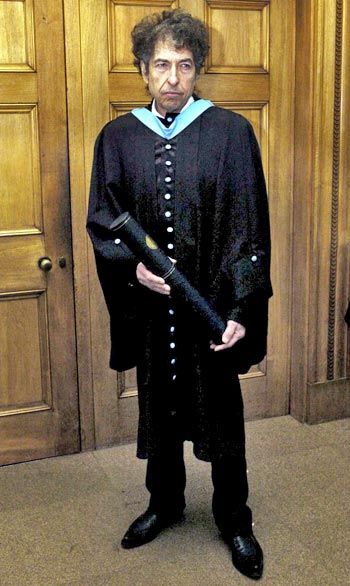 'The Nobel Committee has won the Bob Dylan Prize,' announced the Always Contrarian Everyman, or ACE, a lapsed academic I'd been introduced to by mutual friends to help with some research on communications planning.
'The Nobel Committee has won the Bob Dylan Prize,' announced the Always Contrarian Everyman, or ACE, a lapsed academic I'd been introduced to by mutual friends to help with some research on communications planning.
'Only,' he continued, 'that It gave it to itself, of course.'
He checked my features to ensure that the inversion had registered, peering through a pair of slightly-too-large glasses with white frames.
ACE seemed to belong in the fashionable organic-desserts-only place, a haunt of the swish and the learned, waving at passers-by.
Clearly, no Everyman.
Whether Dylan deserved it has been noisily over-analysed, he said -- both on grounds of scope (are songs poetry?) and merit (is Dylan Whitman?). But what it means remains under-analysed.
The focus on Dylan, he went on, blinds us from spotting the real gainer: The Nobel Prize brand. (Stop wincing, ACE said, it is a brand).
By giving Dylan the prize, the Nobel has taken itself into drawing rooms, hostels and the Twitterscape.
It has gifted itself a popular relevance not available to it before.
The Nobel follows a line of mighty brands that have bent low to kiss the feet of the popular.
The Nobel's relevance has always derived from authority, its own and others'.
Even the Peace Prize's popular recipients have been yoked to structures of authority; Mother Teresa was canonised by the world's most powerful religious organisation.
What we might be approaching is the twilight of authority as way of marketing in its broad sense. But first, let's look at the Deep Design of authority.
Start with the flavours it comes in, ACE continued, propping up the menu like a little blackboard, the ingredients of its authority, and what each tastes like.
At one end of the spectrum are obedience and then loyalty, which may be demanded, enjoined on us or enforced by governments and religious bodies like the Vatican. Yet the Papacy has softened: We have a People's Pope, who loves football, poses for selfies and is soft on homosexuality, abortions and divorce.
But move along the spectrum, and loyalty segues into trust -- the kind sought to be induced by more modern entities informally underwritten by government.
Public universities and banks are examples, as are railways and airlines.
So are the Olympics and the Nobel.
Until 1956, the Games logos reveal an officious face, much like government insignia. From 1960 to 1988 they are broadly modernist and contemporary, but take a celebratory leap from 1992.
The 2012 logo is a frontal challenge to the Olympics' high-minded ideals, giving it a participative, inclusive face.
These visual changes are not fashion, said ACE (stretching a leg to reveal jeans with open hems, finished with elegant white loafers, no socks).
After privatisation, universities have become more like branded corporations, competing for custom.
Their identities, long ignored, now find utterance, and are now sculpted to market admissions, to suggest that university is a place to be enjoyed.
Look at the identities of the newest banks, which are searching for their place on the spectrum between solidity and assurance at one end to an extreme friendliness on the other.
A case in point is the infrastructure finance and bank company IDFC that sports, in its own words, an 'un-bank' identity.
Finally, modern corporation and product brands are a third category, said ACE, his fingers bracketing the menu's Gateaux section. Its authority is the most subtle.
It derives from the technological revolution of the 20th century, which harnessed electricity, gave us time-saving appliances, telecommunication, television, automobiles and computing.
It is also coterminous with the modern Olympics and the Nobel, a prize set up by a maker of munitions to recognise useful sciences (and Peace, naturally).
These brands spoke with a gentle authority, carrying the implicit assurance that you were in good hands: 'Drive to work, punch in, work hard, and return to a home cleaned by vacuum technology and advanced detergents. It was "scientific" and reassuring, and spoke through mass media.'
But the modern corporation's certainties are under attack.
Big Tobacco, Big Soda and Big Food have been rigorously and popularly questioned, and found wanting on transparency and responsibility.
Big Finance caused mass destruction in 2008; Wall Street has been occupied.
The nudge-wink consensus on Iraq has been disowned.
The enlightened new corporation strives for a softer voice. Unilever's old 'twin towers' logo typifies the earlier ideal, solid, imposing, technological and certain. Its new one from 2004 is as relaxed as a spa: Happily fragmented, fluid and loving it.
Further, social media makes it hard to control the conversation, as distinct from the one-way messaging that advertising provided.
True as it is, the rise of social media, and digitisation more broadly, is the handiest explanation but not a sole driver.
The maturing and commodification of manufactured products and services and greater public scrutiny will make the projection of authority less tenable.
Multiculturalism and mobility, the mingling of Asia and Africa into the developed world may be gradually softening Anglo-Saxon confidence.
However, reversals do occur.
The 1997 British Airways rebrand included a tailfin theme called Utopia, featuring 'ethnic' art. It was a step too far: Margaret Thatcher covered the tailfin of the presented model with a paper napkin: 'We fly flags, not these awful things.'
By 2001, the Union Jack was back.
Scores of possible drives resist the powerful consensus that governments, business and mass media construct and maintain.
Eventually, they beget anxieties among groups of dissenters who may feel threatened or disaffected by unstoppable, slow but seismic economic shifts.
For example, such anxieties may drive Trump's supporters to find resonance in his egregious misstatements, as long as he channels their fury onto Hillary Clinton, the Yale Law graduate and Washington technocrat with Wall Street connections who personifies their fears.
Communicators everywhere, whether they are governments and their wards, or businesses will need to adjust their mindset, and this will find an echo in the voice they use.
To paraphrase Rudyard Kipling, it may be wiser to cultivate the common touch than walk with kings.
It's a more democratic world in some ways, said ACE, spooning some single-estate cacao reduction onto his plate, where Bob Dylan can keep the Nobel in suspense by his silence.
Delicious! he said.
Photograph: Reuters

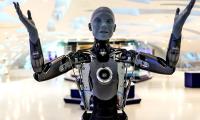
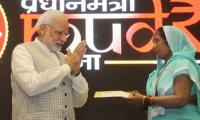


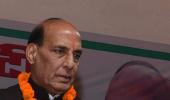







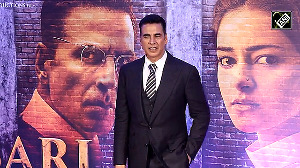

 © 2025
© 2025